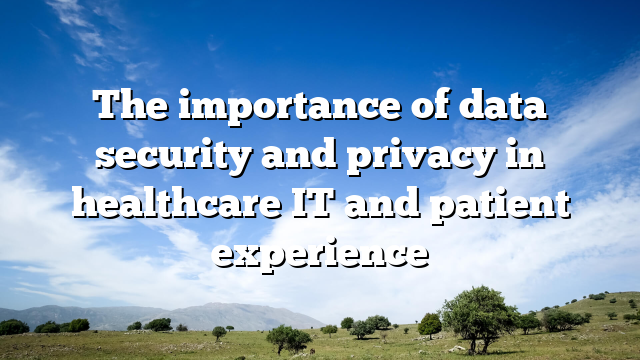Because of the widespread implementation of healthcare information technology in recent years, the healthcare business has undergone a profound transformation (IT). The usage of electronic health records, often known as EHRs, as well as telemedicine and other forms of digital technology have considerably improved both the patient experience and the results. On the other hand, the proliferation of digital information brings with it the need of making maintaining data privacy and security a major concern. In this essay, we will address the significance of maintaining patient privacy and data security within the context of healthcare information technology (IT).
Why is it Essential to Maintain Data Security in Healthcare IT?
Some of the most private and sensitive information, such as medical data, financial details, and social security numbers, is stored in the healthcare business. As a result, it is of the utmost importance to guarantee that sensitive information is safeguarded against theft, hacking, and unauthorized access. Identity theft, financial fraud, and harm to reputation are just some of the potentially disastrous outcomes that may result from a data breach in the healthcare industry.
In addition, as a result of the broad use of EHRs, patient information is now kept electronically, which makes it easier to access and distribute. Nevertheless, this also raises the possibility of data breaches, which means that it is more important than ever before to have comprehensive data security procedures in place.
You might also like to read: The Benefits of Investing in Healthcare IT for Small Practices
The Importance of Protecting the Privacy of Patients
The protection of the patient’s personal information is an essential component of healthcare. Patients have the right to know how their personal and medical information is being used and who has access to it. Patients also have the right to know who else has access to their information. If a patient’s privacy is not protected, there may be significant repercussions, including the possibility of legal action and a breakdown in the confidence that previously existed between patients and healthcare professionals.
To ensure the confidentiality of their patients’ personal information, healthcare professionals are required to comply with stringent privacy requirements, such as those outlined in the Health Insurance Portability and Accountability Act (HIPAA). The Health Insurance Portability and Accountability Act of 1996 (HIPAA) specifies criteria for the use and disclosure of protected health information (PHI) as well as penalties for breaches of those requirements. Healthcare businesses have a responsibility to guarantee that all of their employees have received training on HIPAA standards and that the appropriate precautions have been taken to protect the privacy of their patients.
You might also like to read: Overcoming the Challenges of Modernizing Healthcare IT Legacy Systems: Strategies for Successful Migration
How Concerns About Data Privacy and Security Affect the Quality of Care
The patient’s right to data privacy and protection is an essential part of the whole experience. Patients have the right to expect that the healthcare providers they choose will respect the confidentiality of their personal medical information and shield them from the dangers posed by data breaches. Inability to do so may have a detrimental effect on patients’ confidence in healthcare providers and their willingness to provide personal information with such professionals.
In addition, vulnerabilities in data security might also result in interruptions to the provision of medical care. When the data of a patient is stolen or compromised, the healthcare practitioners who need access to it may not have it, which may have an effect on diagnosis, treatment, and the overall delivery of care. Patients could have to wait longer than usual to get treatment or have to go through procedures more than once, both of which are likely to cause them needless stress and annoyance.
How Healthcare Companies Can Guarantee the Privacy and Security of Their Patients’ Information
In order to guarantee the safety of patients’ personal information, businesses involved in healthcare must take preventative measures regarding data privacy and security. The following are some examples of best practices for healthcare organizations:
- Regularly conducting security risk assessments in order to discover any holes and loopholes in data protection procedures
- Putting in place safeguards such as encryption, firewalls, and other safeguards to secure sensitive patient information granting access to confidential medical information only to those who have a legitimate need for it
- Instruction of staff employees on the rules and procedures governing data security and privacy
Putting up measures for handling incidents in the event of data breaches - Auditing and monitoring data access and use on a regular basis to verify compliance with applicable privacy requirements
You might also like to read: EHRs and Patient Privacy: Ensuring Data Security and Compliance with HIPAA Regulations
Conclusion
The protection of sensitive patient information and the patient’s right to their privacy are both essential elements of modern healthcare IT. When it comes to protecting patient information, preventing data breaches, and maintaining patient confidence, healthcare institutions need to adopt a proactive approach. Healthcare providers are able to guarantee that patient information is safeguarded and that patients have a positive experience by applying best practices and complying to privacy requirements. Patients also benefit from this.

Darren Trumbler is a versatile content writer specializing in B2B technology, marketing strategies, and wellness. With a knack for breaking down complex topics into engaging, easy-to-understand narratives, Darren helps businesses communicate effectively with their audiences.
Over the years, Darren has crafted high-impact content for diverse industries, from tech startups to established enterprises, focusing on thought leadership articles, blog posts, and marketing collateral that drive results. Beyond his professional expertise, he is passionate about wellness and enjoys writing about strategies for achieving balance in work and life.
When he’s not creating compelling content, Darren can be found exploring the latest tech innovations, reading up on marketing trends, or advocating for a healthier lifestyle.
